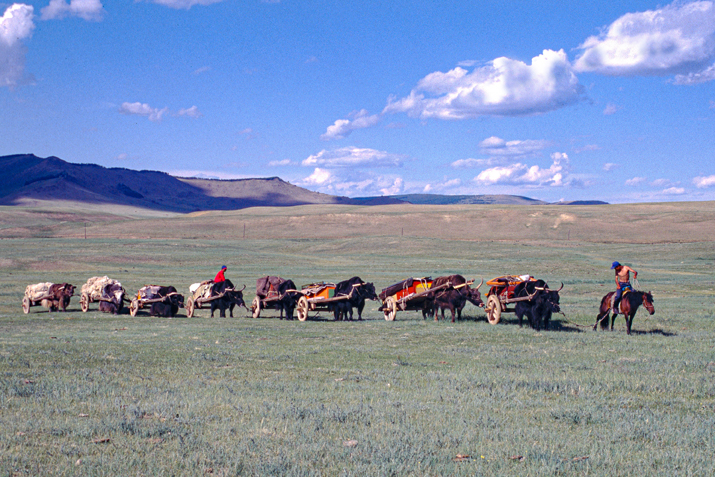
Traveling through a fairytale forest
N 49°00'658'' E 103°16'608''
Day: 41
Sunrise:
06:25 a.m.
Sunset:
7:47 pm
As the crow flies:
15,07
Daily kilometers:
24
Total kilometers:
504
Soil condition:
Meadow
Temperature – Day (maximum):
27 °C
Temperature – day (minimum):
24 °C
Temperature – Night:
minus 8 °C
Latitude:
49°00’658”
Longitude:
103°16’608”
Maximum height:
1340 m above sea level
Time of departure:
12:00 p.m.
Arrival time:
5:30 pm

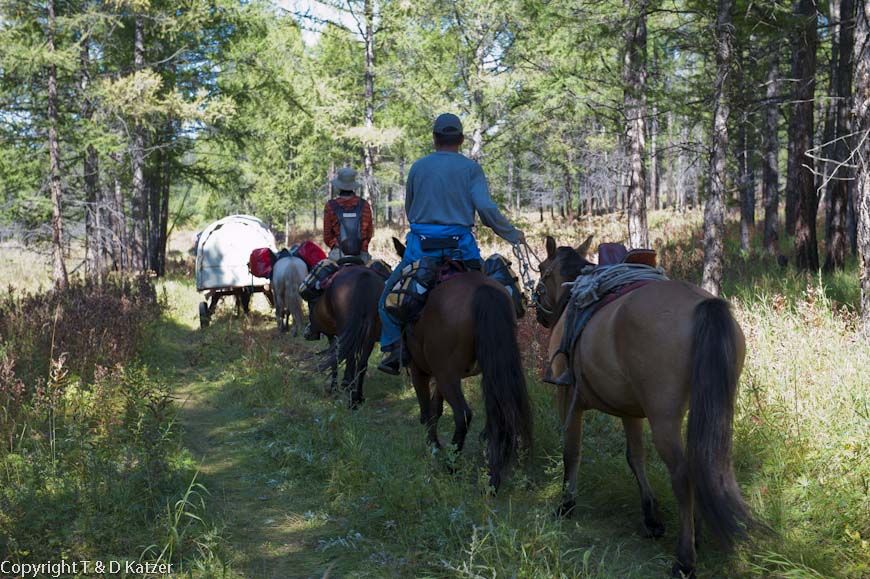
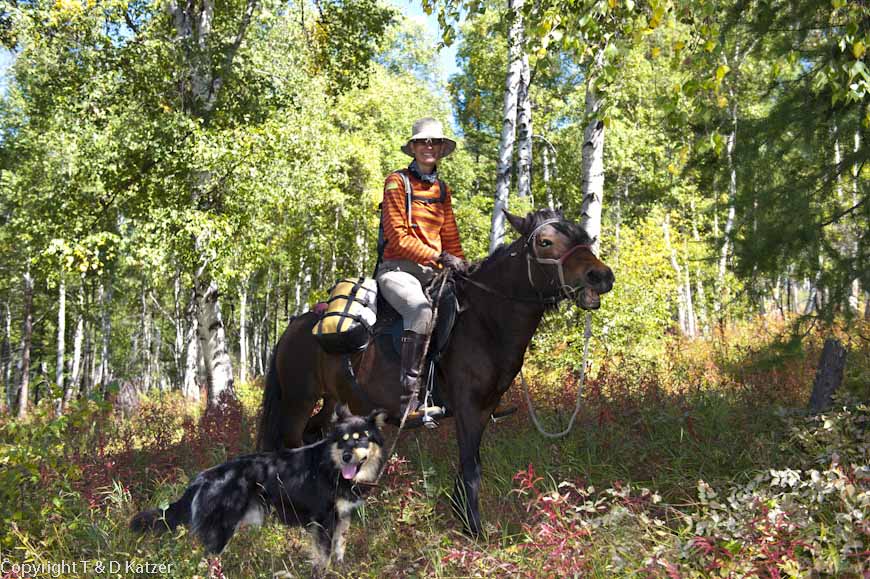

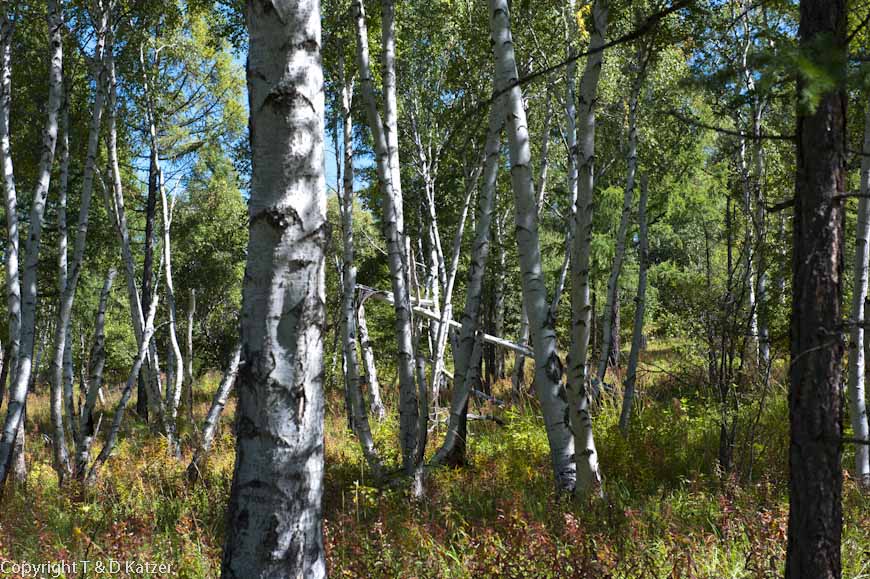
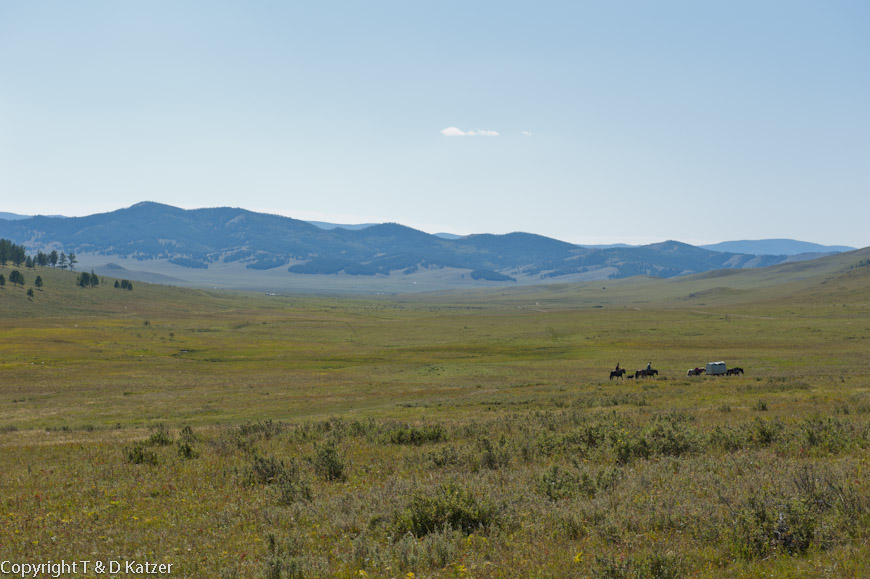
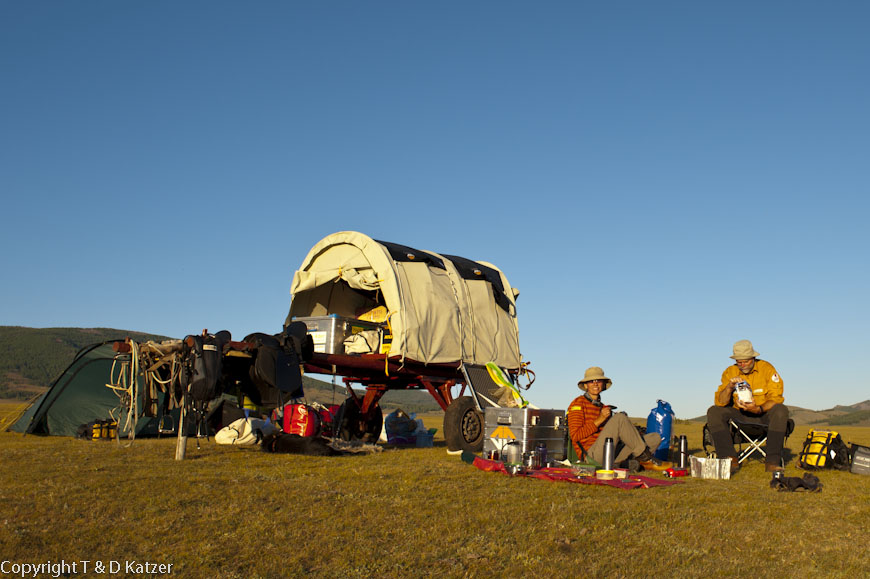

It is 23:47. I’m sitting in an icy tent, writing these lines with cold fingers. The howl of a wolf comes down to us from the mountains. Mogi behaves like a madman. His barking soon drives me crazy. It goes on continuously without any interruption. Furious, I storm out of the tent into the frosty night. “Mogi! Shut up already!” I shout without any success. The dog doesn’t take the slightest notice of me. He stares into the forest and barks and barks. I would love to strangle him. But that doesn’t make any sense either. Then it would be quiet in the camp again, but we would no longer have Mogi. I come up with the idea of hanging a tarpaulin in front of the car and placing several duffel bags in front of it to block any view of the mountainside. Mogi barks a few more times, but then falls silent and shows off a little. Frozen, I creep through the tall grass to our dwelling. I open the frozen canvas and slip into our outdoor house. At midnight I crawl out again to wake Bilgee. Tired, he answers my wake-up call to take over his watch shift.
In the morning we get up at 8:00 a.m. as agreed. Nothing can be seen or heard of Ulzii and Bilgee. As they have pitched their tent about 100 meters above our camp in the meadow slope, Tanja runs up the embankment to wake them up. “They sleep like unconscious people,” says Tanja when she gets back to our tent. At 9:00 a.m. there is still no movement. I go upstairs to wake her up again. After several calls, Ulzii answers sleepily. “Bilgee is very tired.” “What? We’re very tired too. We agreed on an early start,” I reply as the zipper slowly opens. “Bilgee put a lot of effort into driving the horse-drawn cart,” says Ulzii, pointing to the man lying next to him. “Well, at least you can get up then,” I reply and make my way back down to our camp. At 9:15 Bilgee sleepily arrives at the horse-drawn carriage where Tanja has set up the kitchen. “Sorry, I am sorry,” he replies in a friendly manner, immediately taking the wind out of my sails. “That’s okay. The main thing is that you’re here now,” I say, loading some of the equipment into the horse-drawn cart. At the meeting later in the day I ask Ulzii to share the work of driving the horse and cart with Bilgee from now on. “I can understand that this job is too strenuous for one person. That’s why it’s only fair that Ulzii and I support you,” I say. “Sharga is very dangerous. He kicks and bites. I don’t think it’s a good idea for you to lead,” Bilgee replies caringly. We have worked with horses, camels and elephants on our previous expeditions. There were also some unpredictable animals. I think I can manage that. It’s only bad if you don’t know the danger. But we know that Sharga should be treated with caution,” I reply. Bilgee agrees to this. Before we leave, Bilgee soaks the dried goat meat in water so that they can prepare a meal from it in the evening. It’s crazy how they pull the meat around here. It is thrown around like an old pair of shoes. The current storage location is a dirty, dilapidated cloth bag that is stored in a cardboard box in the horse-drawn cart. A piece often falls between the equipment or onto the floor. It doesn’t matter. It is added to soup or cut into dough and cooked. The bacteria are dead but the dirt remains.
Because the cart horse Bor has already lost his horseshoe on the right front, we decided to replace it with a new one today. Ulzii and Bilgee have completely forgotten about this decision, which is why I ask when we want to carry out this important work. Because of the continuing translation difficulties, says Bilgee. “I first had to put the tent together today, go and get water and look after the horses. But I can do it now.” “I didn’t say boron has to be re-hoofed before we set off, I said when we want to do this job. We can also take care of it tonight,” I try to make myself clear, not that Bilgee thinks I want the work done immediately.
Today we manage to be on the road by 12:00 noon. Our small group slowly but steadily works its way up the gentle incline. Today is Sharga’s relief day and Bor has to pull the cart. We move through a fabulously beautiful forest. The tall flower meadows show the first signs of fall. Deep dark red runs through the birch forests whose white trunks contrast with the colorful low-growing greenery. Large, venerable conifers stretch their crowns towards the sky. Their bark is black from past forest fires. Bilgee pulls Bor along a green path through this forest. “I’ve never experienced Mongolia like this before,” I say, enjoying the beautiful day. There are no yurts here, no people. There is no doubt that we are right in what can be described as wilderness. At a fork in the road, Bilgee decides to follow the less-used path. We work our way up the mountain. Boron sweats. Sweat runs in rivulets down his brown fur. The bushes become more and more intrusive and narrow the path so much that it is soon no longer possible to think of getting any further. “We should turn back and follow the better-used grass path,” I suggest. Bilgee doesn’t want to give up the trail and sits on Tenger to scout out the way. He returns 15 minutes later. “We can’t go any further up there,” he says, which is why we turn back.
In the distance we see people harvesting hay. They use a small tracktor for their work. The hay is then loaded onto small trucks and taken to the nomads’ winter camps. “Would you like me to take over from you when you’re leading?” I ask Bilgee, who doesn’t miss the opportunity and waves me off in a friendly manner. We cross a temporary bridge over a stream. Bor masters the transition brilliantly, while Tenger shies away and raises his head in excitement. Ulzii struggles not to lose him a second time but is able to hold him despite a broken halter rope.
At the end of the winding valley we find a nice camp on the edge of a forest. A large herd of horses follows us curiously. Then they chase through the nearby stream at a wild gallop. The water splashed up by the evening sun is carried across the green meadows by the wind. “Welcome to Indian country,” laughs Tanja bravely.
After we have set up our tents and stretched a canopy over the horse-drawn wagon, Tanja takes care of the kitchen while Bilgee and Ulzi want to cook for themselves today because of their meat consumption and completely different tastes. Food is the be-all and end-all for the two of them. Without meat, they would be very unhappy and unstoppable on the trip. You have a small gas stove with you but no gas. “Can we get a gas cylinder, please?” asks Ulzii. Since we cook with gasoline, I bought two gas bottles in Erdenet just on a gut feeling and can offer them to our companions. “These are the only ones we have. You have to make do with them,” I say. “Strange. Although they know they’re going on a trip like this and need gas cartridges for their stove, they don’t have any with them. How are you supposed to understand something like that?” asks Tanja. “Who knows? Maybe cooking with gas has become so normal in Mongolia that they didn’t even think about the fact that we could use something else to heat our food. Nevertheless, they could have made us aware of this when we went shopping. With the amount of energy they use to prepare their elaborate meals, one cartridge is enough for a maximum of three to four meals. So we’ll soon have an energy problem,’ I think aloud and consider whether we should cook on the campfire in future. “That’s a good idea. It looks like there’s a lot of forest here and therefore a lot of wood,” Tanja agrees with me.
While we eat our dinner, Tanja and I talk about the itinerary and whether we can reach our destination before winter. The days are getting colder and colder. Temperatures have fallen far below zero, especially at night. It gets colder with every kilometer we ride further north. The city of Mörön is the coldest city in Mongolia. In Mörön we have to rethink our route and plans. If it gets too cold, we can no longer think of getting any further with our very poorly equipped people. They are already freezing more than us every night.
Even before we crawl into our tents, we decide to stay here for two days. Bilgee had expressed an indirect wish to go hunting here in the afternoon. As we are aware of how important a satisfied crew is, we made this decision. We also have to give Bor a new horseshoe. The dangerous Sharga has also lost one on its hind foot. However, in my opinion, it is life-threatening to re-shoe him. His ex-owners are apparently not the best people. How else can an animal become so dangerous to humans? It should have made us suspicious when they wanted to sell it immediately. My gut feeling had warned me. But I had ignored it for fear of not getting another cart horse. Now we have such a completely unpredictable animal with us, although it was our top priority to buy only good horses.
“Today I feel freer again for the first time. As if I belong here. My head is slowly becoming clearer again. The stress in Germany and the strenuous preparations are slowly beginning to fade. I think one of my most important learning tasks during this trip is to take everything more calmly. Not to always put so much pressure on myself. Maybe I’ll learn that from the Mongolians. They are much more relaxed in this respect. It would be fantastic if we could become one with this country. If we could take on some of its strength, power and tranquillity,” I say to Tanja, stretching out in my sleeping bag.
We look forward to your comments!

